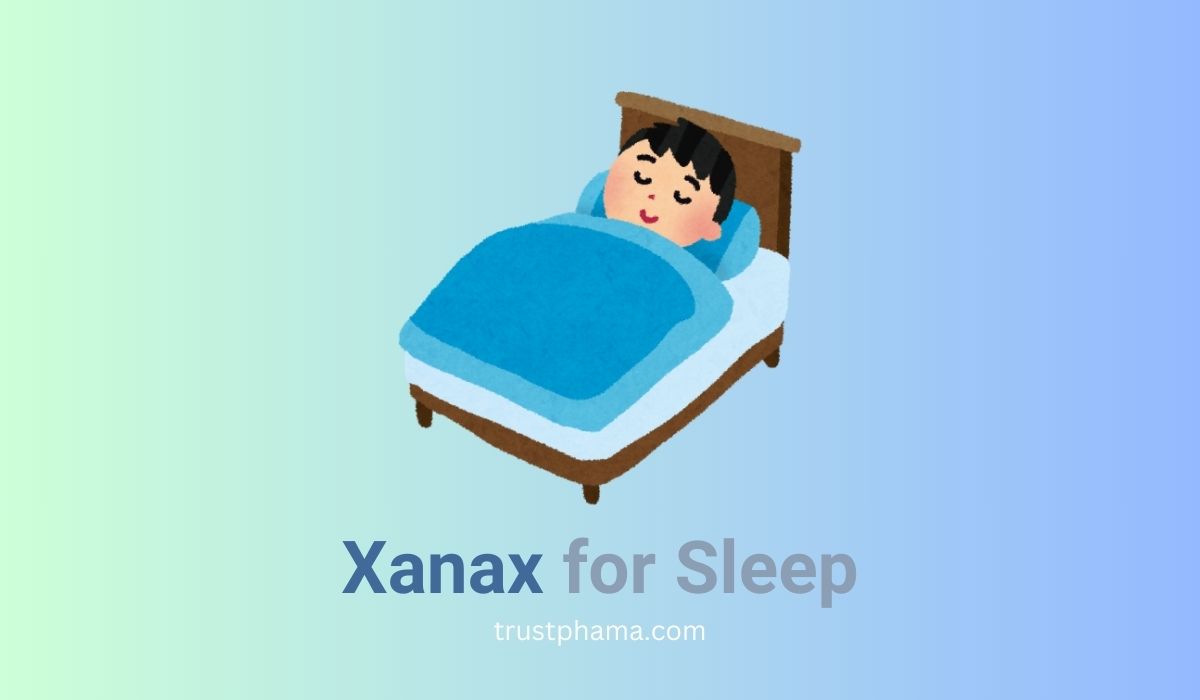Xanax, the brand name for alprazolam, is a prescription medication primarily used to treat anxiety and panic disorders. As a benzodiazepine, it works by calming the brain and central nervous system, which is why it is sometimes used off-label to help with sleep problems. While Xanax may seem like an effective solution for insomnia, its use as a sleep aid comes with important considerations, risks, and limitations. This article explores how Xanax works for sleep, its potential benefits, risks, and alternative treatments for insomnia.
How Xanax Works for Sleep
Xanax enhances the activity of gamma-aminobutyric acid (GABA), a neurotransmitter that slows down brain activity. This action promotes relaxation and sedation, making it easier to fall asleep. For individuals with anxiety-related insomnia, Xanax can help calm racing thoughts and reduce tension, enabling better sleep onset.
Is Xanax Effective for Sleep?
While Xanax can be effective in helping people fall asleep quickly, it is not designed as a primary treatment for insomnia. Its sedative effects are strong, but the medication is short-acting, meaning its benefits for maintaining sleep throughout the night may be limited.
Benefits of Using Xanax for Sleep
- Fast-Acting:
Xanax typically starts working within 15 to 60 minutes, making it a quick solution for falling asleep. - Anxiety Relief:
For people whose insomnia is linked to anxiety, Xanax can address both issues simultaneously. - Short-Term Solution:
When used for brief periods (e.g., during acute stress or travel-related insomnia), Xanax can provide temporary relief.
Risks and Downsides of Using Xanax for Sleep
- Dependence and Addiction:
Regular use of Xanax, even over a short period, can lead to physical and psychological dependence. Long-term use increases the risk of addiction. - Tolerance:
Over time, the body may require higher doses to achieve the same sedative effects, further increasing dependency risks. - Rebound Insomnia:
Discontinuing Xanax abruptly can lead to a return of insomnia, often worse than before starting the medication. - Side Effects:
- Drowsiness and fatigue.
- Memory problems or confusion.
- Dizziness or unsteadiness, increasing the risk of falls, especially in older adults.
- Short Duration of Action:
Xanax has a relatively short half-life (around 11 hours), which may not provide sustained sleep throughout the night. - Potential for Misuse:
As a controlled substance, Xanax has a high potential for abuse, particularly if used without a prescription or taken in higher-than-recommended doses.
Who Should Avoid Xanax for Sleep?
Xanax may not be suitable for everyone, particularly:
- Older Adults: Increased sensitivity to benzodiazepines can lead to confusion, falls, and other complications.
- People with Substance Abuse Histories: The risk of addiction is higher in individuals with past or current substance abuse issues.
- Pregnant or Breastfeeding Women: Xanax can harm fetal development or pass into breast milk.
- Those with Chronic Insomnia: Long-term sleep issues are better addressed with non-benzodiazepine treatments or therapy.
Alternatives to Xanax for Sleep
- Prescription Sleep Medications:
- Non-benzodiazepine sedatives like zolpidem (Ambien) or eszopiclone (Lunesta) are specifically designed to treat insomnia with fewer risks of dependence.
- Melatonin:
A natural supplement that regulates the sleep-wake cycle and may be helpful for short-term sleep problems. - Over-the-Counter Sleep Aids:
Antihistamines like diphenhydramine (Benadryl) or doxylamine can help with occasional sleeplessness but may cause daytime drowsiness. - Cognitive Behavioral Therapy for Insomnia (CBT-I):
An evidence-based, long-term solution that addresses the underlying causes of insomnia without medication. - Lifestyle Changes:
- Maintain a consistent sleep schedule.
- Limit screen time and caffeine intake before bed.
- Create a comfortable, sleep-friendly environment.
Key Takeaways
- Short-Term Use Only: Xanax may be effective for occasional or short-term sleep problems, particularly if anxiety is the root cause.
- Significant Risks: Long-term use for sleep is not recommended due to risks of dependence, tolerance, and side effects.
- Better Alternatives Available: Safer and more effective treatments for chronic insomnia, such as non-benzodiazepine medications and CBT-I, are widely available.
Conclusion
While Buy Xanax UK can provide temporary relief for sleep issues, it is not a first-line treatment for insomnia and should be used cautiously under the guidance of a healthcare provider. If you struggle with sleep problems, consult a doctor to explore safer and more sustainable solutions tailored to your specific needs.
